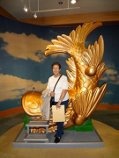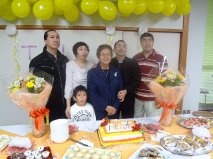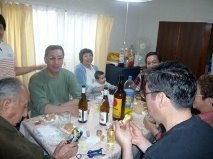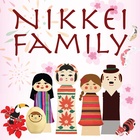At home I grew up keeping in mind that on my mom's side we are of Japanese descent and on my dad's side we are pure Peruvians, so to speak. My grandfather Beni, who was a true Peruvian, also added words to his lexicon and I still remember with great affection when he would call me to drink ocha or ask me about the gohan of the day.
When my oba took me to visit her brothers she always referred to them as niisan or oneesan and greeted them with a kiss on the cheek and they called her Toki. I didn't understand those words and why they called her that if her name is Victoria. Sometimes I stayed looking at them and listening to what they were saying, from time to time a word or two would jump out that I didn't understand. Then he told me that was his name in Japanese. Despite that, my oba did not learn Japanese...
When we went to visit the cemetery, she told me: “my dad really liked kiku .” Kiku ? What is that? And I saw that he was asking for the pompous white and yellow flowers, ahh, the chrysanthemum. On my great-grandfather's tombstone I saw some drawings that I did not understand, next to his name written in Spanish, Kyuma Shiraishi, as well as the tombstone of his wife, Lucia Castro Piñas, which had wreaths of paper flowers hanging on them. My oba told me that they were the crowns left by those from the Nikkei association of Huancayo.
If you ask me where my oba's family is from, I would say that her parents settled in Huancayo, where she and most of her siblings were born, although her father came from Ehime and her mother from Chupaca. A unique mix.
My ojii Kyuma was a serious person and arrived in Peru when he was only 14 years old. God will know from the things he must have gone through and what decision led him to go to such a distant country, in addition to having been an only child. I feel like a legend, a mystery, a person whom I would have loved to meet and have been able to talk to in his mother tongue, which today is the mother tongue of his descendants who were born and raised in Japan.
In my oba's anecdotes, he tells me about his father's adaptation to Peruvian culture and the implementation of his Japanese culture with his wife. This unique fusion which I like to call “Shiraishi-Castro culture”, with which we grew up and today is part of our days.
In one of his many stories he tells me about the undokai that they made with the Japanese colony, the natto that Kyuma prepared and left it wrapped in newspapers so that it fermented between the mattress of his bed or the sushi that he prepared and that Kyuma liked so much. his dear Lucy. The glass shop they had as a family business on Ayacucho Street, which was also managed by their older brothers, or the difficult time they went through during the Second World War, when she remembers it, tears fall.
About 20 years ago, my oba and my grandfather traveled for the first time to Japan, to the land where their father Kyuma was born. By then, all her children had already settled there and they took her to visit Matsuyama in Ehime-Ken, the town of Kyuma Shiraishi. I remember that he had really enjoyed getting to know a country that he only knew about from photos, or because his dad told him about it when he was young.
Years later, our grandchildren arrived in Japan. My grandparents had already been living there for some time with my parents and close to their other children. They had already adapted to this new and exquisite culture, adopting new customs, but keeping Peruvian culture in mind. We grew up in this mix of cultures, my oba in Peru with his Japanese father and his Peruvian mother, and we in Japan, with our Nikkei -Peruvian roots. My brothers and cousins who were born in Japan say: “I am Peruvian born in Japan.” A very unique term, I think.
I am grateful for having Japanese blood, for having inherited the adventurous gene of my ojii Kyuba, which took me to many places, and for having given me the opportunity to grow up in their land and preserve this fusion of cultures that our entire family carries, with which we continue to grow and will continue in the following generations.
© 2015 Elvi Del Rosario Tamia Leiva Pizarro






